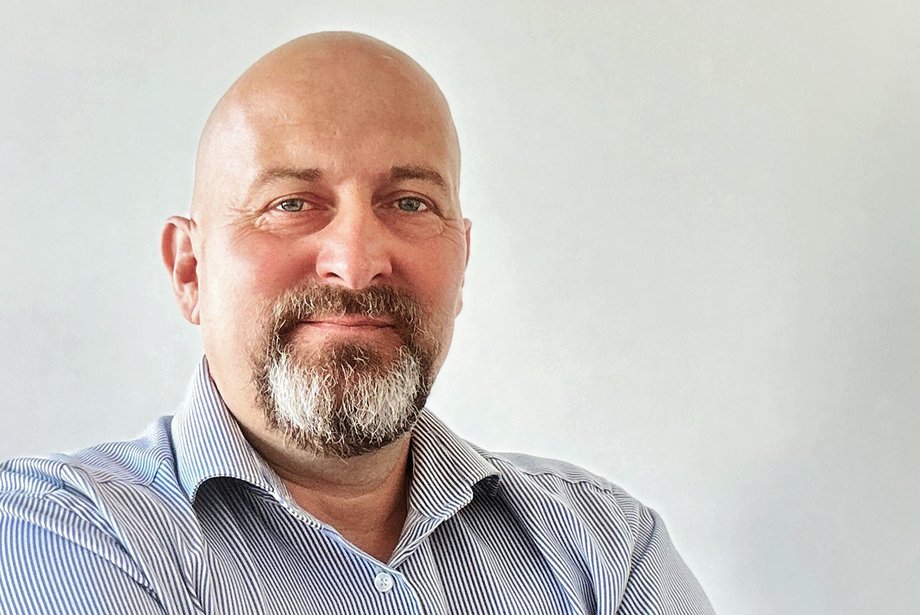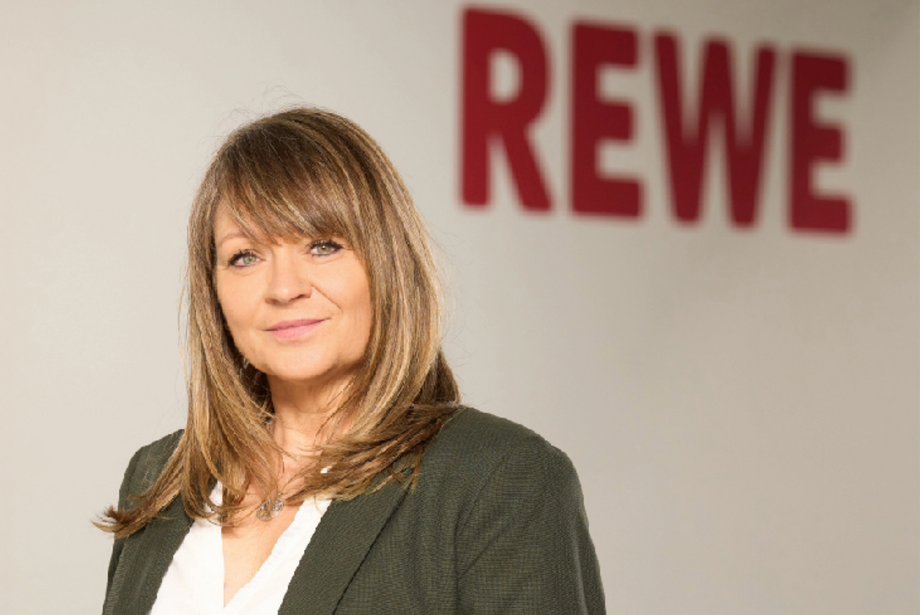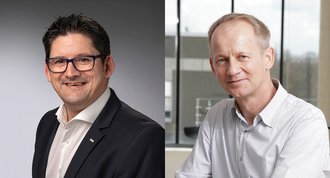
Look instead of looking away, speak up instead of remaining silent, act instead of shrugging your shoulders: Andreas Heimhöfer and Ines Popp, two of our experienced company addiction officers, know how colleagues and senior managers can support those affected by addiction.
Around 80 REWE Group colleagues, who volunteer as company addiction officers and act as contact persons for those affected, supervisors and team colleagues, show a way out of addiction and back into a productive working life. In the first part of our series, we presented how and on what basis they become active. Here, two addiction officers from the very beginning, Ines Popp and Andreas Heimhöfer, talk about their tasks:
Andreas Heimhöfer, training coach and company addiction officer in the eastern region, talks about his tasks, the drugs used by the very young and the more sensitive way of dealing with affected colleagues.
one: Mr Heimhöfer, what do you do as an addiction officer?  Andreas Heimhöfer
Andreas Heimhöfer: On the one hand, I advise and support those affected and their superiors, I help with the step-by-step discussions and provide further addresses, for example of self-help groups. Sometimes I accompany them to their first meeting at an addiction counselling centre, i.e. I take them to the entrance. I then check in later to see how they are doing and stay in regular contact, even if they go to an addiction clinic for a longer stay.
Andreas Heimhöfer
Andreas Heimhöfer: On the one hand, I advise and support those affected and their superiors, I help with the step-by-step discussions and provide further addresses, for example of self-help groups. Sometimes I accompany them to their first meeting at an addiction counselling centre, i.e. I take them to the entrance. I then check in later to see how they are doing and stay in regular contact, even if they go to an addiction clinic for a longer stay.
Prevention is a very important point for me. This includes informing all employees about our workplace health promotion programmes. It also involves working with our colleagues who are responsible for balancing work and family life, because there's a lot involved in addiction. And I talk about the topic of addiction. It's important to me to educate people about how addiction comes about. I want to ensure that no one with an addiction problem is labelled as such.
one: Who do you educate?
Andreas Heimhöfer : I educate everyone, whether trainees, senior managers or HR partners, for example if someone has stolen. If we realise that there is an addiction problem behind the theft, then we deal with it in a completely different way. I also try to educate people at my trainee seminars. Not with a raised index finger, but at eye level. Then at some point they listen and start to think about it.
one: Do the very young employees have other addictions?
Andreas Heimhöfer : Weed is an issue. But cannabis is an absolute no-go in our working environment. In my eyes, cannabis is no better than alcohol and legalising this drug makes it socially acceptable. Then there are the young people I call "console warriors". These are the ones who gamble late into the night, don't get out of bed in the morning, make a lot of mistakes or produce a lot of absences and can't cope at vocational school.
Gambling addiction is somewhat less common. We've had colleagues who have stolen and wanted to put the money back after winning. But everyone knows that you basically never win.
Alcohol addiction, on the other hand, tends to affect older young people and adults. The path to addiction is a long process that usually begins with personal blows of fate.
one: How do you get out of it?
Andreas Heimhöfer: The more advanced an addiction is, the harder it is to kick it. As a former smoker, I know this only too well. Admitting to an addiction is difficult, but it's the first step. However, employees have to realise this themselves. We addiction officers can't save anyone, we can only help them to help themselves. If someone doesn't want to, then it won't work.
one: Colleagues are often the first to realise that something is wrong...
Andreas Heimhöfer: Yes, and they sometimes feel like 'traitors', they don't want to 'denounce' anyone. I can understand that. But you should always realise that silence doesn't help those affected. My tip is always: talk, don't judge or look away. We addiction counsellors are a good point of contact here. We are bound by confidentiality, you can talk to us and get support.
one: How does the employer deal with employees suffering from addiction?
Andreas Heimhöfer: I think we're on the right track. We have the general works agreement, which gives senior managers a kind of intervention plan with a fixed sequence: a care dialogue, up to five step-by-step discussions with clearly defined processes and goals. A fair instrument for everyone involved.
In general, people have become more sensitive. Whether in the stores or at head office, most people are open with each other. Many of those affected talk to their line managers, who in turn do everything they can to ensure that employees are well. They are not dismissed because they are addicted, but go to therapy with the prospect of getting their old job back after therapy and reintegration. I know that many other companies are much tougher in this respect and are quicker to give notice. With us, they keep their job. But of course, if you carry on after the fifth and final stage meeting, don't stick to the rules, don't go to therapy, then you can be dismissed. But before that, we give you every chance to get well. Or rather: to get clean. After all, you never get completely healthy.
Andreas Heimhöfer, HR Competence Centre Teltow, has been working as a training trainer at REWE Group for twelve years, most of that time at PENNY, now in the REWE East region. he completed his training as a company addiction officer in 2018. Before joining REWE Group, he worked for various training organisations, including in the juvenile detention system.
Ines Popp, company addiction officer in the southern region for 17 years, on the key role of senior managers and the relevance of taking a closer look.
one: Ms Popp, as a company addiction officer, are you more of a point of contact for senior managers or for the affected colleagues themselves?  Ines Popp
Ines Popp: Iam the point of contact for anyone who needs counselling and support. Senior managers often contact me first; those affected usually only come to me after the manager has already had a counselling session. Then they are told: "Please contact the addiction counsellor, she can support you". This opens up the opportunity for everyone involved to find new ways forward together.
Ines Popp
Ines Popp: Iam the point of contact for anyone who needs counselling and support. Senior managers often contact me first; those affected usually only come to me after the manager has already had a counselling session. Then they are told: "Please contact the addiction counsellor, she can support you". This opens up the opportunity for everyone involved to find new ways forward together.
one: It's usually only the colleagues who notice it. How should they deal with it?
Ines Popp : Those affected are usually very happy when you talk to them, because they basically know themselves that they can't go on like this in the long term. Alcohol addiction, for example, lasts ten to 15 years on average. When it is finally recognised, it is often a relief for the vast majority of people and they are grateful. This also applies to senior managers. When senior managers discuss their observations and concerns in a confidential counselling session, many burst into tears and gratefully accept help afterwards.
one: How do you help those affected yourself?
Ines Popp: I specifically look for counselling centres that deal with the addiction in question. Once an appointment has been made, I know that the employee is in good hands. Addicts often try to pass on responsibility. But the first step out of addiction is to admit it to yourself. The second step is to take responsibility for the change. This also means that the appointments at the counselling centres must be arranged by those affected themselves.
one: Speaking of behavioural change: how can employers provide long-term support here?
Ines Popp : Senior managers with personnel responsibility play a key role in preventing addiction in the workplace. It is particularly important to be sensitive to warning signs - this could be the smell of alcohol, a change in behaviour or conspicuous carelessness - and to have an early, clarifying discussion. The first step is always the aforementioned caring discussion. If necessary and individually tailored, there can also be a clarification discussion with senior managers, HR partners and, if necessary, with me. At the end of the initial discussion, it is advisable to point out specific support services - for example, internal help or local addiction counselling centres that can help you to overcome your addiction. In any case, the most important thing is to be firm and consistent as a senior manager.
one: What addictions are we talking about?
Ines Popp: First of all, all addictions are illnesses and must be treated as such. Alcohol addiction, for example, can be found in every age group. Among young people, especially young men, we also have online addictions, i.e. gambling or streaming addiction. And we have cannabis - but legalisation or not: intoxicating substances are prohibited by law in the workplace.
one: But online addiction is not intoxicating, is it?
Ines Popp: Researchers assume that - as with every addiction - the "happiness hormone" dopamine is also released in this behavioural addiction. In any case, one thing is certain: sitting in front of your PC or mobile phone until early in the morning and working in the market from six o'clock onwards - that doesn't work well in the long term, you become restless and unfocused at work and the risk of accidents increases.
one: What advice would you give to anyone affected or in contact with those affected?
Ines Popp: Deal with the topic of addiction sensitively and consciously. Look and act instead of looking away. And if you feel helpless yourself, get help.
Ines Popp has been with REWE (Southern Region) since 2001 and has been responsible for occupational health management and work-life balance for many years. trained as a company addiction officer in 2007, additional training in "Addiction and mental illness" in 2020.








